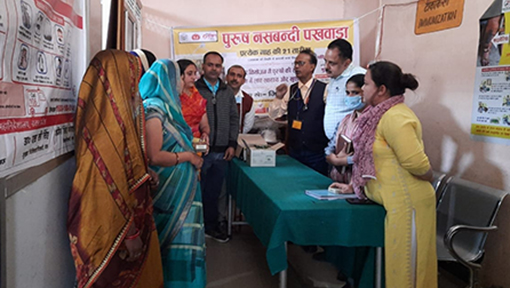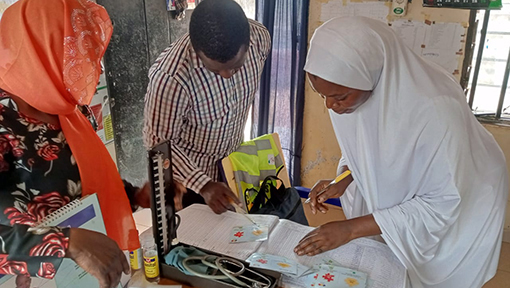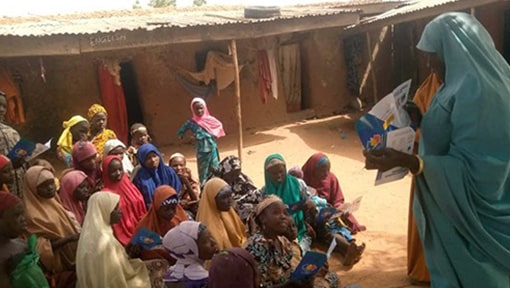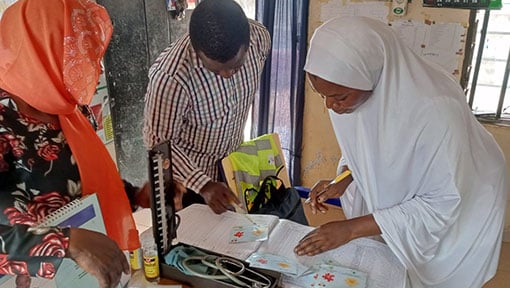TCIHC Coaching Empowers Mau to Scale-up Family Planning High Impact Interventions
Contributors: Subhreet Khare, Meenakshi Dikshit, Parul Saxena

A fixed-days static services day at a UPHC in Mau.
The Challenge Initiative for Healthy Cities (TCIHC) works with city governments in Uttar Pradesh, India, to implement and sustain reproductive health solutions through its innovative coaching model. Recently, five additional cities, including Mau, joined the partnership to receive TCIHC coaching support.
The TCIHC coaching model is structured to support all levels of the hierarchical government health system. This includes support at the city officials’ level and urban primary health center (UPHC) level, including Auxiliary Nurse Midwives (ANMs) and Accredited Social Health Activists (ASHAs). as in other TCIHC-supported cities, TCIHC followed its coaching model in Mau to provide conceptual and practical ‘know-how’ and transfer capacity to local government stakeholders so they can implement high-impact interventions. Mau began implementing in January 2021.
Two government functionaries from Mau recently shared changes they have witnessed as a result of TCIHC’s coaching. Dr. P. K. Rai, Additional Chief Medical Officer/Family Planning Nodal officer shared:
Before we joined hands with TCIHC, we were not regular in validating mapping and listing of slums areas. As a result, we were unaware of the health needs of the left-out population. Though urban ASHAs were onboard, they were untrained in family planning. It was mostly the oral contraceptive pills or tubectomy that we offered as a choice to the women. With TCIHC coaching, we have learnt to identify such gaps across the service delivery points, demand generation, reporting, etc.
We learnt that to activate UPHCs for provisioning long-acting clinical methods, service providers need to be trained on new contraceptives and reoriented on IUCD. We took this requirement to the CMO [Chief Medical Officer] who supported us to formulate a training plan. We also conducted a joint visit with TCIHC coaches to the UPHC to oversee the facility, assess FP stock and review progress. We have started taking measures on all fronts. We just printed urban health index register (UHIR) for distribution to ASHAs. All of these steps are expanding access to quality family planning services and yielding good results. However, more work is required to reduce gaps. TCIHC has pioneered a new way of thinking and working in us; I am confident our partnership with TCIHC will help the urban poor to meet their family planning needs.”
Dr. Jawed Akhtar, Medical-Officer-In-Charge (MOIC) of the Bharhu ka Pura UPHC, echoed similar sentiments:
“TCIHC offers a unique coaching approach. TCIHC has coached us on identifying gaps and opportunities for improving family planning services. For example, we could not start Antral diwas (Fixed Day Static service) at our UPHC as our staff nurse and ANMs were untrained. We had a dysfunctional autoclave [used for sterilizing medical instruments and supplies]. We identified such gaps by using the facility readiness checklist of TCIHC. We learnt that there are line items in the PIP [the government of India’s planning and budgeting process] which we could utilize to equip the facility. TCIHC also coached us on HMIS reporting and data validation practices. Today, as a focal person for the UPHC, I ensure that quality family planning services are provided to clients by following all the protocols set by the government of India. I am glad that we have TCIHC’s support to efficiently and effectively drive the urban family planning program in Mau.”
TCIHC’s coaching support has also positively impacted Shimla Yadav, an ANM at the Bharhu ka Pura UPHC, who shared:
“[The] TCIHC team coached me on how to strengthen the capacities of ASHAs, how properly fill the UHIR register and utilize it for decision making. I am transferring these skills to my ASHAs. It is only after the TCIHC intervention that ASHAs of our UPHC have received UHIR.”
The HMIS data below indicates that TCIHC’s coaching activities are beginning to show results as Mau is on a progressive path. All four UPHCs in Mau are observing a substantial growth in family planning services uptake as apparent from January to June 2021 data in comparison to the same period the previous year. UPHCs of Mau are lined up for district quality assurance committee (DQAC) visits and certification, which will enable its UPHCs to add IUCD services to the basket of choice of family planning methods.

The city of Mau has embraced TCIHC’s high-impact interventions and started to fill critical gaps in demand generation activities and quality of family planning services. Furthermore, the city is preparing to take steps to improve the use of data for decision-making, combat family planning supply stock-outs, procure the needed equipment for family planning service delivery, strengthen data quality mechanisms, and initiate a visit of DQAC to its UPHCs for assessing quality standards – all while having to address several other competing health priorities, including COVID-19 care and treatment needs.






